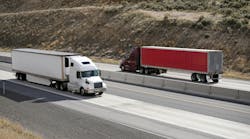The expression “time is money” has endured for generations, due in no small part to the fact that it's generally true — at least in the business world. Efficiency and financial returns are greater, or expenses lower, if things can be accomplished in a shorter period of time with no loss of quality.
When it comes to making decisions in trucking, however, I'd give “place” equal consideration. The costs associated with switching the location at which a task is done, for example — whether due to consolidation or outsourcing — can be substantial.
The kinds of costs I'm talking about include alternative site utilization, labor training for off-site personnel, utility costs, and specialized equipment purchases and/or maintenance. While estimating these costs is relatively straightforward, it's important to take the age, state of repair (or disrepair) and upgrade needs of the current in-house facility into consideration for purposes of comparison.
Then there are the costs that aren't so easy to quantify: insurance; security risks; inventory management and liability, including just-in-time component availability; and alternative in-house labor deployment.
Consultants and business school professors frequently tell us to concentrate on our core business. If trucking companies were to this advice literally, they'd focus solely on freight P&D. Some might even infer that support functions are best handled by “outside” experts, leading them to outsource many aspects of their business.
The more difficult strategic question becomes how far to take this advice. Tire and wheel maintenance, truck PMs, major component rebuilding, warranty administration, billing, accounts receivable, and even personnel administration are all candidates for outsourcing.
Seasoned managers who have experienced outsourcing first-hand caution that there are several things you need to be aware of before you decide to outsource part of your business. First, as fleet manager you still bear ultimate responsibility for results. This means you have to choose your vendors carefully and monitor their work. If the quality of the work slips because the third-party provider gets complacent or sloppy will reflect poorly on you.
Second, you should realize that if the third-party provider performs to industry standards that aren't as high as yours, you could end up with lower standards. For example, this could happen when a vendor performs the same task or service for multiple clients, including some of your competitors. At best, you won't have the competitive edge in that area, and at worst you might unknowingly share information that works to a competitor's advantage.
The best way to avoid these pitfalls is to conduct diligent benchmarking before hiring an outside provider and make provisions in the contract to protect any proprietary processes. Clauses that specifically address resolution of differences are also helpful.
Another risk is potential loss or diminishment of company culture that may provide a positive differentiation for your company. How customers and employees perceive your operation — in terms of prompt service, old-fashioned attention, personal follow-up, and overall quality — can be affected. At worst, you could become “just another trucking company” to those you depend on most.
Decisions about who does what and where it's done shouldn't be made lightly. Outsourcing can bring new efficiencies and reliability to your operation. But if you don't do your homework, it can cost dearly in terms of morale, expenses, and quality control — all of which are critical to long-term competitiveness.


